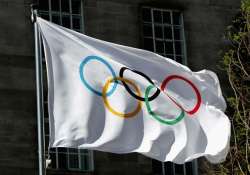IOC letter to Sports Ministry surprises IOA officials
New Delhi, Apr 13: The International Olympic Committee's move to write a letter directly to the Sports Minister for a joint meeting has come as a surprise for suspended IOA officials, who point out that

New Delhi, Apr 13: The International Olympic Committee's move to write a letter directly to the Sports Minister for a joint meeting has come as a surprise for suspended IOA officials, who point out that the parent body was contradicting its own stand.
The IOC has written separate letters to the IOA and the Sports Minister, extending its invitation for a meeting in Lausanne on May 7 in yet another attempt to find a way for the country's return to the Olympic movement, even as the stand-off between the government and sport body persisted.
On earlier occasions, the IOC had interacted strictly with the IOA and never directly with the government. The letters were written to IOC member in India, Randhir Singh and IOA's Acting President V K Malhotra.
But by writing directly to the Ministry, the IOC has appeared to have gone against their own rule.
On December 4, 2012, the IOC had cited government interference as the reason for banning the IOA.
“It is very surprising that IOC has decided to communicate directly with the Sports Ministry. The IOA was suspended by IOC because it followed the government code for the elections. The IOC charter says there should not be any government interference, so how can the IOC communicate with the government directly” a top IOA official asked.
After IOA decided to go ahead with their December 5, 2012 elections under the government's Sports Code, defying the IOC's diktat to hold the polls under the Olympic Charter, the IOC suspended IOA.
The IOC had repeatedly told the IOA not follow the government's sports code for the elections on the ground that it would be a violation of the Olympic Charter and
compromise autonomy. But the IOA went ahead saying they were bound by the Delhi High Court order.
Interestingly, in a letter dated January 14, 2013, the IOC had made it clear that the suspended IOA would be in a position to hold free, fair, transparent and credible elections only without any external interference and exclusively on the basis of the Olympic Charter and the IOA's Constitution.
For that purpose it had issued a series of guidelines to the IOA, and one of them stated: “The relevant Government authorities definitively amend or repeal any Government regulations or laws which interfere with the autonomous functioning and internal operations (including election rules) of the suspended IOA”.
The IOC has written separate letters to the IOA and the Sports Minister, extending its invitation for a meeting in Lausanne on May 7 in yet another attempt to find a way for the country's return to the Olympic movement, even as the stand-off between the government and sport body persisted.
On earlier occasions, the IOC had interacted strictly with the IOA and never directly with the government. The letters were written to IOC member in India, Randhir Singh and IOA's Acting President V K Malhotra.
But by writing directly to the Ministry, the IOC has appeared to have gone against their own rule.
On December 4, 2012, the IOC had cited government interference as the reason for banning the IOA.
“It is very surprising that IOC has decided to communicate directly with the Sports Ministry. The IOA was suspended by IOC because it followed the government code for the elections. The IOC charter says there should not be any government interference, so how can the IOC communicate with the government directly” a top IOA official asked.
After IOA decided to go ahead with their December 5, 2012 elections under the government's Sports Code, defying the IOC's diktat to hold the polls under the Olympic Charter, the IOC suspended IOA.
The IOC had repeatedly told the IOA not follow the government's sports code for the elections on the ground that it would be a violation of the Olympic Charter and
compromise autonomy. But the IOA went ahead saying they were bound by the Delhi High Court order.
Interestingly, in a letter dated January 14, 2013, the IOC had made it clear that the suspended IOA would be in a position to hold free, fair, transparent and credible elections only without any external interference and exclusively on the basis of the Olympic Charter and the IOA's Constitution.
For that purpose it had issued a series of guidelines to the IOA, and one of them stated: “The relevant Government authorities definitively amend or repeal any Government regulations or laws which interfere with the autonomous functioning and internal operations (including election rules) of the suspended IOA”.